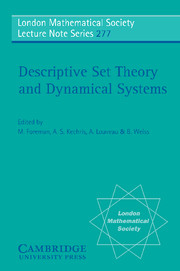Book contents
- Frontmatter
- Contents
- Preface
- 1 An Overview of Infinite Ergodic Theory
- 2 The Multifarious Poincaré Recurrence Theorem
- 3 Groups of Automorphisms of Measure Space and Weak Equivalence of Cocycles
- 4 A Descriptive View of Ergodic Theory
- 5 Structure Theory as a Tool in Topological Dynamics
- 6 Orbit Properties of Pseudo-homeomorphism Groups of a Perfect Polish Space and their Cocycles
- 7 Descriptive Dynamics
- 8 Polish Groupoids
- 9 A Survey of Generic Dynamics
6 - Orbit Properties of Pseudo-homeomorphism Groups of a Perfect Polish Space and their Cocycles
Published online by Cambridge University Press: 05 August 2013
- Frontmatter
- Contents
- Preface
- 1 An Overview of Infinite Ergodic Theory
- 2 The Multifarious Poincaré Recurrence Theorem
- 3 Groups of Automorphisms of Measure Space and Weak Equivalence of Cocycles
- 4 A Descriptive View of Ergodic Theory
- 5 Structure Theory as a Tool in Topological Dynamics
- 6 Orbit Properties of Pseudo-homeomorphism Groups of a Perfect Polish Space and their Cocycles
- 7 Descriptive Dynamics
- 8 Polish Groupoids
- 9 A Survey of Generic Dynamics
Summary
Abstract. Let Γ be a countable group of pseudo-homeomorphisms of a perfect Polish space X. In a well known work by Sullivan, Weiss, and Wright, the orbit properties of such groups are described. We consider ergodic cocycles for such group actions (in other terms, cocycles with dense ranges) with values in Polish groups. The uniqueness theorem for such cocycles is proved, specifically, that modulo a meagre subset of X, any two ergodic cocycles α and β are weakly equivalent (α is cohomologous to β up to automorphisms of a full group normalizer N[Γ]). This result is applied to establish the outer conjugacy of countable groups of pseudo-homeomorphisms from the normalizer N[Γ] of the full group [Γ]. Another application here is to the subrelations of ergodic countable equivalence relations on a perfect Polish space. In particular, a complete classification of normal ergodic subrelations is obtained, which presents some new information on the orbit structure for groups of pseudo-homeomorphisms.
Introduction
The problem of studying cocycles of automorphism groups on a measure space permanently attracted the attention of specialists because such cocycles carry an important information about a dynamical system. Primarily, this field was discovered by G. Mackey [11], who introduced the basic notions and constructions, which allow one to use cocycles for producing profound invariants of group actions. Among those, one should mention the skew product and the so called Mackey action associated to a cocycle. That was an essential impetus for extensive research on cocycles; by now it advanced appreciably in measure theoretic ergodic theory.
- Type
- Chapter
- Information
- Descriptive Set Theory and Dynamical Systems , pp. 211 - 230Publisher: Cambridge University PressPrint publication year: 2000

